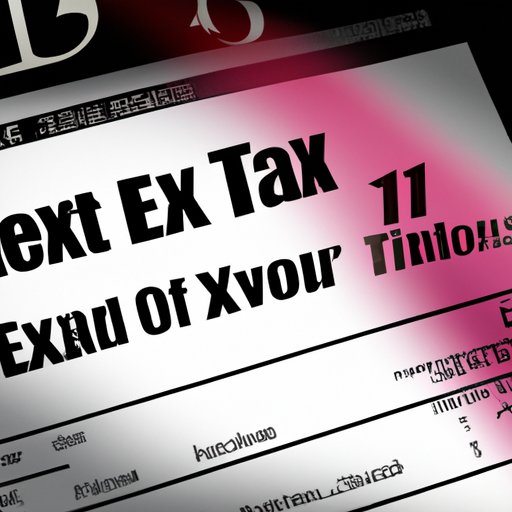Introduction
Tax season is a stressful time of year for many people, and it’s common for some individuals to find themselves in a situation where they need to file a tax extension. An extension gives taxpayers more time to file their taxes, but it does not offer more time to pay any taxes owed. It’s important to understand when taxes are due if you’ve filed an extension and how to meet your obligations so you don’t incur any penalties or fees.

Tax Deadlines: What to Know if You Filed an Extension
The Internal Revenue Service (IRS) requires all taxpayers to file their taxes by April 15th each year. If you’re unable to do this, you can file for an extension, which generally allows you six additional months to file your return. It’s important to note that filing for an extension does not give you more time to pay any taxes you owe; any taxes owed must still be paid by the April 15th deadline.
Understanding the Tax Deadline
If you file a tax extension, your new filing deadline will be October 15th. This means you have until that date to submit your completed tax return to the IRS. If you fail to file your return by October 15th, you may face late filing penalties.
An Overview of Tax Extension Rules and Regulations
The IRS offers several types of extensions that you can file depending on your individual needs. The most common type is the automatic six-month extension, which is available to all taxpayers. To qualify, you must fill out Form 4868 and submit it to the IRS before the April 15th deadline.
Tips for Meeting Your Tax Obligations After Filing an Extension
If you’ve filed an extension, you should make sure to meet your tax obligations as soon as possible. Be sure to keep track of the deadlines and set reminders for yourself to ensure you’re meeting them. Additionally, you should take steps to gather the necessary documents and information needed to complete your tax return, such as bank statements, W-2 forms, and other income records.

How to File Your Taxes After a Tax Extension
Once you’ve gathered all the necessary documents, you’ll need to file Form 4868 with the IRS. This form extends your filing deadline and also lets the IRS know you intend to file your tax return. Once you’ve submitted the form, you’ll have six months to file your tax return.
Gather Necessary Documentation
Before you can file your taxes, you’ll need to gather all the necessary documents and information, such as your bank statements, W-2 forms, and other income records. Make sure to double-check that you have all the required documents before submitting your tax return.
File Form 4868
Form 4868 is the form you’ll use to request an extension from the IRS. Once you’ve filled out the form, you’ll need to submit it to the IRS before the April 15th deadline. Once you’ve done this, you’ll have six months to file your tax return.
Pay Any Estimated Taxes Owed
When filing an extension, you’ll need to estimate any taxes you owe and pay them by the April 15th deadline. If you don’t pay your estimated taxes by this date, you may be subject to late payment penalties. It’s important to remember that filing an extension does not give you more time to pay any taxes you owe; you must pay them by the April 15th deadline.
What You Need to Know About Paying Taxes After a Tax Extension
If you haven’t paid any taxes you owe by the April 15th deadline, you may be subject to late filing penalties. Additionally, you may also be charged interest on any taxes you owe. According to the IRS, “If you owe taxes and don’t pay them by the April 15 due date, you will owe interest on the unpaid balance, plus a late payment penalty.”
Tax Penalties for Late Filing
If you don’t file your taxes by the October 15th deadline, you may be subject to late filing penalties. The IRS notes that “the failure-to-file penalty is normally 5 percent of the unpaid taxes for each month or part of a month that a return is late. That penalty starts accruing the day after the tax filing due date and will not exceed 25 percent of your unpaid taxes.”
Payment Options for Taxes Owed
If you owe taxes, there are several payment options available to you. You can pay by check or money order, by credit or debit card, or through an electronic funds transfer. Additionally, you can set up a payment plan with the IRS if you’re unable to pay your taxes in full.

Late Filers: Make Sure You Meet Your Tax Extension Deadline
If you’ve filed a tax extension, it’s important to make sure you meet the October 15th deadline. Failure to do so could result in late filing penalties and other fees. To avoid this, you should set reminders for yourself and file your taxes as soon as possible.
Set Reminders
To ensure you meet the October 15th deadline, set reminders for yourself throughout the six-month period. This will help you stay on top of your obligations and ensure you’re meeting your tax extension deadline.
File as Soon as Possible
Even though you have six months to file your taxes, it’s best to file as soon as possible. This will help you avoid any unnecessary stress and ensure you’re meeting the deadline. Additionally, it will give you more time to pay any taxes you owe.
Conclusion
Filing a tax extension can be a helpful way to get more time to file your taxes, but it’s important to remember that it doesn’t extend the deadline for paying any taxes you owe. To ensure you’re meeting your obligations, you should understand when taxes are due after a tax extension, how to file your taxes, and what payment options are available. Additionally, it’s important to set reminders for yourself and file as soon as possible to avoid any late filing penalties.
In summary, filing a tax extension can be a helpful way to buy yourself more time to file your taxes, but it’s important to remember that the deadline for paying any taxes you owe remains the same. To ensure you meet your obligations and avoid any penalties or fees, it’s important to understand the rules and regulations surrounding tax extensions and to set reminders for yourself and file as soon as possible.
(Note: Is this article not meeting your expectations? Do you have knowledge or insights to share? Unlock new opportunities and expand your reach by joining our authors team. Click Registration to join us and share your expertise with our readers.)
